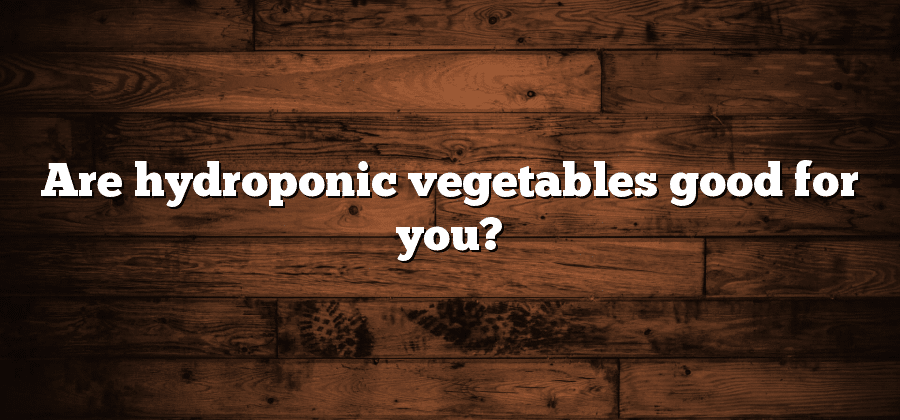Benefits of Hydroponic Vegetables
Hydroponic vegetables have gained significant popularity in recent years due to the numerous benefits they offer. One of the key advantages is that they can be grown in controlled environments, allowing for year-round cultivation irrespective of outdoor weather conditions. This not only ensures a consistent supply of fresh produce but also reduces the dependence on seasonal availability.
In addition, hydroponics entails the use of nutrient-rich solutions that are directly delivered to the plant roots, resulting in significantly accelerated growth rates compared to traditional soil-based farming. This enhanced growth leads to higher crop yields in a shorter period. Moreover, since hydroponic systems eliminate the need for soil, farmers can effectively save space, making it a suitable option for urban farming or areas with limited arable land.
Different Methods of Hydroponics
Hydroponics, the soil-less method of farming, offers a variety of different techniques to grow plants effectively. One of the most popular methods is the nutrient film technique (NFT). In this system, a thin film of nutrient-rich water flows over the plant roots, providing them with the necessary oxygen and nutrients. This technique allows for efficient nutrient absorption and optimal plant growth. Another widely used method is the deep water culture (DWC) system, where the plant roots are suspended in a nutrient solution that is constantly oxygenated. This method promotes vigorous root development and enables the plants to absorb nutrients efficiently.
Another method of hydroponics is the ebb and flow system, also known as flood and drain. In this system, the plants are periodically flooded with nutrient-rich water, and then the excess water is drained away. This cyclic process ensures that the plants receive a steady supply of nutrients while preventing waterlogging. Additionally, the aeroponic system utilizes a mist to deliver nutrients directly to the roots suspended in air. This method allows for maximum oxygenation of the root zone and reduces water consumption compared to other systems.
Each of these hydroponic methods has its own advantages and is suitable for different types of plants and environments. The choice of method ultimately depends on factors such as available space, plant species, and personal preference. Experimentation and a thorough understanding of each technique can help growers select the most appropriate method to maximize their yields and produce high-quality hydroponic vegetables.
Nutritional Value of Hydroponic Vegetables
Hydroponic vegetables offer several nutritional benefits that make them a popular choice for health-conscious individuals. The controlled environment in which hydroponic plants grow allows for precise nutrient delivery, resulting in vegetables that are often higher in vitamins, minerals, and antioxidants compared to traditional farming methods. This is because hydroponic plants can absorb nutrients more efficiently and are not dependent on nutrient availability in the soil. By optimizing the nutrient composition, hydroponic vegetables can have higher nutritional value and provide a reliable source of essential nutrients.
Furthermore, the absence of soil in hydroponic systems eliminates the risk of contamination from pesticides, herbicides, and other harmful substances. This ensures that the vegetables grown hydroponically are free from harmful residues, making them a safer and healthier option for consumers. Additionally, hydroponic vegetables are typically harvested when they are at their peak in terms of nutrient content, maximizing their nutritional value and offering a fresh and flavorsome choice for individuals seeking to improve their dietary intake.
Comparison with Traditional Farming
Hydroponic farming has gained popularity in recent years as an alternative to traditional farming methods. One of the key distinctions between hydroponic and traditional farming lies in the use of soil. While traditional farming relies on soil as the medium for plant growth, hydroponic systems eliminate the need for soil altogether. This has several advantages, as it allows for precise control over nutrient levels and pH values, resulting in healthier and more productive plants. In contrast, traditional farming methods often face challenges such as soil erosion and depletion, which can lead to reduced crop yields and decreased soil fertility over time.
Furthermore, hydroponic farming offers a more sustainable approach compared to traditional farming. By eliminating the need for large amounts of land and reducing water usage, hydroponics can help mitigate the negative environmental impacts associated with conventional farming practices. Additionally, hydroponics allows for year-round crop production, regardless of climate or geographical constraints. This offers a significant advantage over traditional farming, which is subject to seasonal variations and limitations. Overall, the comparison between hydroponic and traditional farming demonstrates the potential for hydroponics to revolutionize the way we grow and consume food.
Increased Crop Yield with Hydroponics
One of the significant advantages of hydroponics is the potential for increased crop yield. With this innovative method of farming, growers are able to optimize plant growth by providing an ideal environment for plants to thrive. The controlled conditions, such as nutrient-rich water and precise pH levels, enable plants to absorb nutrients more efficiently, resulting in faster and more robust growth.
In traditional farming, crops are often subject to the limitations of soil quality and availability. With hydroponics, plants are not dependent on soil and can be grown all year round, allowing for multiple harvests and a more consistent supply of fresh produce. Additionally, the ability to control factors such as light, temperature, and humidity further enhances the growth potential of the crops. The increased crop yield achieved through hydroponics not only benefits farmers and suppliers but also contributes to meeting the growing demand for high-quality, sustainably produced food.






